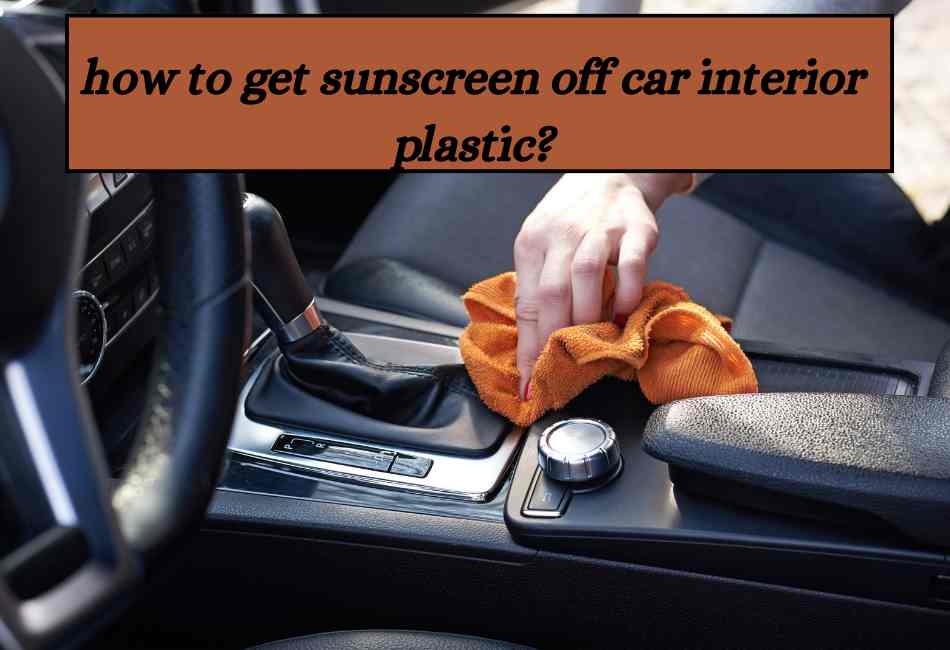Sunscreen is an essential companion for any outdoor enthusiast. However, it can often be an unwelcome guest when unintentionally smeared on the interior plastic components of your car.
This common issue may seem minor, but if left unaddressed, it can lead to stains, discolorations, and even long-term damage to your vehicle’s interior.
Furthermore, sunscreen’s stubborn, greasy residue can be challenging to remove with regular cleaning materials. But fret not.
This article focuses on simple yet effective home remedies to tackle sunscreen smears on your car’s interior plastic.
Let’s dive into these solutions to help you keep your car clean, fresh, and free from sunscreen residue.
How Sunscreen Residues Occur on Car Interior Surfaces
Trust me, I’ve been there. Returning from a sunny day at the beach, I once carelessly tossed my sunscreen bottle onto the passenger seat. Unbeknownst to me, a smudge of cream leaked onto my car’s dashboard.
By the time I discovered it, a greasy film had formed. This is a typical scenario of sunscreen residues on car interior surfaces.
Types of Plastics Commonly Used in Car Interiors
The interior plastic components of most cars consist of polyvinyl chloride (PVC) or ABS plastic.
These materials are durable and wear-resistant, but they are not immune to the oily compounds found in sunscreen.
I learned this hard when my once gleaming dashboard developed a stubborn, dull patch after my sunscreen accident.
The Potential Long-Term Damage
Ignoring sunscreen stains on your car’s interior plastic can lead to discoloration and, over time, an uneven surface texture.
I remember the regret I felt when the once smooth surface of my dashboard turned rough and patchy because I didn’t immediately address the sunscreen residue.
Home Remedies for Sunscreen Removal
1. Vinegar Solution
- Mixture Ratio of Vinegar and Water
Having learned from my past mistakes, I’ve discovered a simple yet effective remedy for sunscreen stains — a vinegar solution. Mix equal parts of white vinegar and warm water in a spray bottle.
How to Apply the Solution on Plastic Surfaces
Spray the vinegar solution onto the stained area and let it sit for a few minutes, then gently wipe it off with a soft cloth. Do a spot test first to ensure the solution won’t discolor the plastic.
Using Vinegar for Its Cleaning and Deodorizing Properties
Besides its cleaning properties, vinegar is a natural deodorizer, leaving your car fresh and clean. I’ve found this to be a real game-changer in maintaining the cleanliness of my car’s interior.
Besides, it’s always satisfying to know I’ve tackled tough stains with a solution made from everyday household items.
2. Baking Soda Paste
Creating a Paste with Baking Soda and Water
Another proven home remedy for sunscreen stains is baking soda paste. You need equal parts of baking soda and water to create this effective paste.
Mix them until they form a thick, spreadable paste. I remember the first time I tried this, skeptical about its effectiveness. However, the results were pleasantly surprising!
Gentle Application and Scrubbing Process
Apply the baking soda paste onto the stained area with your fingers, spreading it gently. After allowing it to sit for a few minutes, scrub lightly with a soft cloth or toothbrush.
I was thrilled to see the sunscreen stains fading after my first gentle scrubbing session.
The Abrasive Nature of Baking Soda
What’s brilliant about baking soda is its mildly abrasive nature. This removes the stubborn sunscreen residue without risking any damage to the plastic surface.
I was amazed to see my dashboard regain its original shine, all thanks to some baking soda and water.
3. Rubbing Alcohol
- Proper Dilution of Rubbing Alcohol with Water
Rubbing alcohol is another effective solution to eliminate sunscreen residues. To use this method, dilute rubbing alcohol with equal parts of water.
I was initially apprehensive about using alcohol on my dashboard, but a friend assured me that dilution was the key to avoiding any potential damage.
- Use a Soft Cloth or Sponge to Apply the Solution
Dip a soft cloth or sponge into the diluted alcohol solution and dab it onto the sunscreen stain. As with the previous solutions, always do a spot test first.
I recall the satisfaction of the stubborn sunscreen stains disappearing as I dabbed the solution onto them.
- The Alcohol’s Effectiveness
The real magic of rubbing alcohol lies in breaking down the sunscreen residues and evaporating, leaving behind a clean, unstained surface.
Seeing my dashboard restored to its original condition was a testimony to the effectiveness of this common household item.
4. Lemon Juice
- Mixing Lemon Juice with Water for a Natural Solution
Lemon juice is a surprisingly effective natural solution for stubborn sunscreen stains. To create this solution, mix equal parts of lemon juice and water.
The first time I tried this method, I was skeptical about its effectiveness. However, I was pleasantly surprised by the outcome.
- Application with a Clean Cloth or Sponge
Like the other methods, apply the lemon juice solution with a clean cloth or sponge. The first time I tried this, the fresh citrusy scent of the lemon juice made the process feel almost therapeutic.
- Acidic Properties of Lemon Juice in Breaking Down Sunscreen
The secret behind lemon juice’s effectiveness is its acidic property, which breaks down sunscreen stains.
When I saw the stains dissolve after a few applications of the lemon solution, I was truly amazed at how something as simple as lemon juice could restore the shine of my dashboard.
5. Commercial Plastic Cleaner
- Introduction to Reputable Commercial Cleaners
Sometimes, the stains are so stubborn that a commercial plastic cleaner might be your best bet. There are many reputable brands out there that I have tried, and they work wonders.
- Application Instructions and Precautions
Most commercial cleaners come with specific instructions. I always follow them to the letter, wearing gloves and ensuring the area is well-ventilated. It’s always better to be safe than sorry.
- When to Consider Commercial Cleaners Over Homemade Remedies
While I prefer using homemade solutions, there have been instances where commercial cleaners were my only hope.
When the stains are too stubborn, or I’m dealing with delicate materials, I turn to these professionals in a bottle. The results have always been impressive, making the purchase worthwhile.
Best Practices for Application
- General Guidelines for Applying Remedies
When it comes to applying any of these remedies, consistency is key. I’ve found that a regular cleaning schedule helps to prevent any stubborn stains from setting in.
Don’t be discouraged if the stain doesn’t disappear after the first application – persistence often pays off.
- Importance of Testing a Small, Inconspicuous Area First
I cannot stress enough the importance of testing a small, hidden area first. I learned this hard when I applied a new cleaner without testing, which discolored my dashboard.
Since then, I’ve tested new cleaners or remedies on an inconspicuous spot before applying it fully.
- Specific Recommendations for Each Remedy
For baking soda, remember to dust off the residue thoroughly after cleaning. With vinegar, dilution is important to avoid potential damage.
With lemon juice, rinse it off completely to avoid sticky residue. For commercial cleaners, always wear protective gloves and ensure the area is well-ventilated.
Conclusion
The key takeaway from my experience has been that sunscreen residues should be dealt with promptly. The longer they stay, the harder they are to remove and the greater the potential damage to your car’s interior.
In summary, baking soda, vinegar, lemon juice, and commercial cleaners are all effective remedies for tackling sunscreen residues. Each has its strengths and can be chosen according to the severity of the stain and your personal preference.
Regular maintenance is crucial to preserving the quality of your car’s interior plastics. Don’t wait for the stains to pile; attack them early and maintain a regular cleaning schedule.
My journey through these cleaning methods has reinforced my belief in the power of simple, natural remedies.
With just a few items from your kitchen, you can maintain a clean and well-preserved car interior sans the damage from harsh chemicals. It’s a win-win situation!

